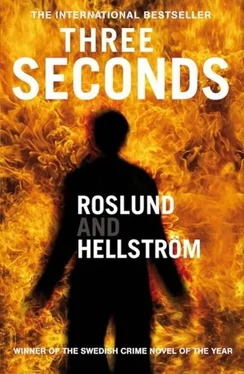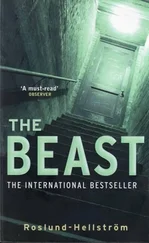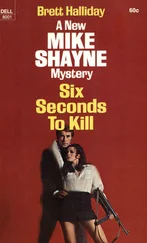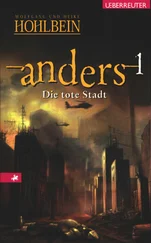Erik Wilson closed the door to Sankt Eriksplan 17 and paused in the silence, away from the traffic frenzy. The stairwell was dark and when he was unsuccessful in his third attempt to turn on the lights he decided to take the small elevator up to the fifth floor, getting out into a construction site. The flat was being totally renovated, so the tenants had been moved out. He stood on the brown paper and listened to nothing until he was certain that he was alone, then opened the locked door with STENBERG written on the letter box, went in to the two rooms and kitchen and checked over the furniture that was protected by transparent plastic sheeting. This was how he operated. A couple of the biggest private landlords in the city gave him the keys and work schedules for flats that were empty and being renovated. This was number five. Wilson had used it for just under a month; he'd met several different infiltrators here. He would keep it until the renovation was finished and the tenants had moved back in.
He pulled back the plastic from the kitchen window, opened it, and looked out over the communal gardens at the back, with carefully raked gravel paths and some new outdoor furniture over by the two swings and short slide. Paula would be there in a minute. He'd come out of the back door of the house opposite that had an entrance at Vulcanusgatan 15. Always in an empty flat, always with a communal garden at the back that could be accessed from another address.
Erik Wilson closed the window and taped the plastic back against the glass, just as the door below opened and Paula hurried along the gravel path.
Ewert Grens impatiently clutched the folder that contained Nils Krantz's photographs of a dead man. Ten minutes earlier, he had sent one of them to a fax machine in the crime operations unit in Copenhagen, a photograph of a head that had been washed, but still had skin, before the autopsy. There were three other pictures in the folder and he studied them while he waited. One taken from the front, one from the left side, one from the right. A considerable amount of his working day was taken up looking at pictures of death and he had learned that it was often difficult to distinguish whether someone was asleep or actually dead. This time it was fairly obvious as there were three great holes in the head. If he hadn't been to the scene or been handed a photograph by someone from forensics or received it by fax from a colleague somewhere else, he usually started by looking for the shiny steel stand that the head always rests on, and if he found it, it was a photograph from an autopsy. He looked at the pictures again and wondered what he would look like, what a person studying the photo of his head on a steel stand would think.
"Grens."
The phone finally rang and he put the folder down on the desk. "Jacob Andersen, Copenhagen."
"Well?"
"The photograph you faxed."
"Yes?"
"It's probably him."
"Who?"
"One of my informers."
"Who?"
"I can't say. Not yet. Not before I'm absolutely certain. I don't want to disclose an informer unnecessarily. You know how it works."
Ewert Grens knew how it worked and didn't like it. The need to protect the identity of covert human intelligence sources-CHIS- had increased as they had become more numerous, and sometimes was more important than the need for the police to provide each other with correct information. Nowadays, when each and every policeman could call themselves a handler and had the right to make their own CHIS contacts, the secrecy was more often a hindrance than a help.
"What do you need?"
"Everything you've got."
"Dental impressions. Fingerprints. We're waiting for the DNA." "Send it."
"I'll do that straight away. And I assume that you'll call again in a few minutes."
The head on the steel stand.
Grens stroked his finger over the smooth photographic paper.
An infiltrator. From Copenhagen. One of two people who spoke Swedish in a flat when a Polish mafia execution took place.
Who was the other one?
Piet Hoffmann walked down the gravel path through the dull communal garden. A quick glance up at the fifth floor of the building opposite, where he caught a glimpse of Wilson's head in a window that happened not to be protected by plastic. He had left Frédéric Chopin on the first plane just after eight, the Polish carrier LOT. He had spent the night with his forehead pressed against a cold windowpane, but he wasn't particularly tired. Anxiety and adrenaline from a day that had included a person being killed and an important meeting in Warsaw jostled in his breast; he was definitely heading somewhere and had no idea how to stop. He had called home and Rasmus had picked up the phone and didn't want to let go of the receiver because he had so much to tell; it hadn't been easy to follow it all, something about a cartoon and a monster that was green and horrible. Piet Hoffmann swallowed and shook, as you do when you miss someone more than you were physically prepared for-he would see them this evening and he would hold all three of them tight until they asked him to let go. He got to the fence and opened the gate, and moved from the garden of Vulcanusgatan 15 to that of Sankt Eriksplan 17, and then in through the back door to the stairs that remained dark, even though he flicked the switch for the lights several times. Five flights of steep stairs, never a elevator with the risk of getting stuck, each step covered with brown paper that made it difficult to move without making a noise. He checked the bells and names on the letter boxes. The door with STENBERG on it opened from inside at eleven hundred hours precisely.
Erik Wilson had taken the plastic off two chairs and the table in the kitchen and was now uncovering the gas cooker and a cupboard under the sink. He hunted around until he found a pan and a jar of something that looked like instant coffee.
"The Stenbergs' treat. Whoever they are."
They sat down.
"How's Zofia?"
"I don't know."
"You don't know?"
"We haven't seen much of each other in the past couple of days. But her voice-we spoke for quite a long time on the phone last night and again this morning-and I can hear it, she knows that I'm lying, that I'm lying more than usual."
"Take care of her. You know what I mean?"
"You know damn well that I take good care of her."
"Good, that's good, Piet. Nothing you do is worth more than her and the kids. I just want you to remember that."
He didn't like the instant coffee much, there was a stale aftertaste, reminiscent of the coffee in the more expensive restaurants in Warsaw.
"He should never have said he was the police."
"Was he?"
"I don't know. I don't think so. I think he was like me. And that he was bloody frightened."
Wilson nodded. He probably had been frightened. And in a panic had flung out the words that he thought would protect him. But had had the opposite effect.
"I heard him scream I'm the police, a gun being cocked and then a shot." Hoffmann put his cup down-the instant coffee was undrinkable, no matter how hard he tried.
"It's been a while since I saw someone die close at hand. That silence when they stop breathing and you hold on to the last breath until it ebbs away."
Erik Wilson was looking at someone who had been touched by death and lived with the responsibility for it; the rather lean man in front of him who could be hard as nails when he needed to be, was someone else right now It was three years since they had taken the first steps to infiltrate Wojtek Security International. The national crime operations division had identified the company as a flourishing branch of the Eastern European mafia that was already established in Norway and Denmark. The CHIS controller at City Police had forwarded the intelligence report to Wilson and reminded him of Paula's background, that Polish was his other mother tongue and that he was in ASPEN, the criminal intelligence database, and had a criminal record that was solid enough to withstand any checks and probing.
Читать дальше












